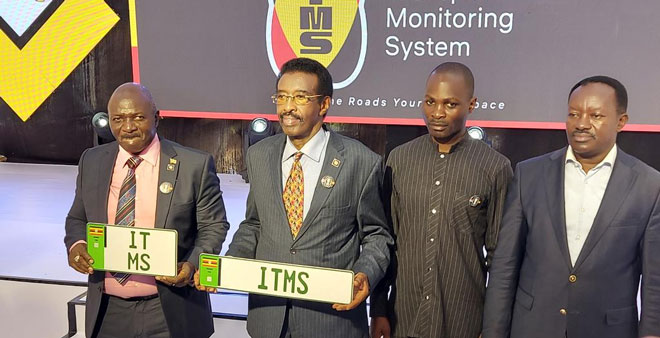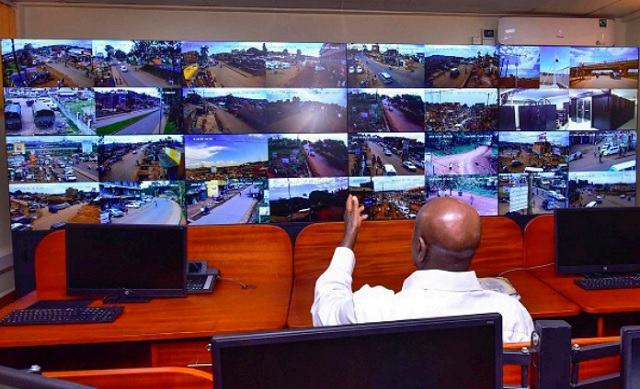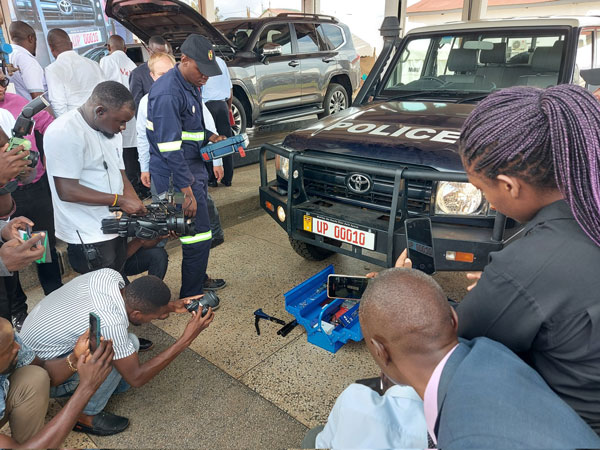
Government pushes ahead with project despite concerns over Russian contractor and potential human rights violation
Kampala, Uganda | AGATHER ATUHAIRE & HAGGAI MATSIKO | As July 01 which is the new launch deadline for digital number plates in Uganda approaches, The Independent has new details about Security Minister Jim Muhwezi’s troubles in ensuring it does not fail this time – despite many concerns.
Details emerging centre around a meeting that Muhwezi called in the President’s Office in Kampala on Feb.13. In attendance at the high level meeting held in the cabinet library were about 30 officials from different government agencies connected to implementation of the digital number plates project or the Intelligent Transport Monitoring System (ITMS), as the project is officially called.
Also present were officials from the contractor, Joint Stock Company Global-Security, who make up the project implementation team. Readers will recall that the rolling out the digital number plates was initially scheduled for Feb.01 but the project implementers led by Muhwezi had failed to meet that deadline.
As of March this year, only 240 government vehicles had been fixed with digital number plates yet Uganda had slightly over 2.3 million private and government vehicles by 2020, according to statistics from Ministry of Works and Transport.
Apparently although the contractor is Russian, the plates are actually manufactured in Poland and sent to Uganda in small batches. Susan Kataike, the ministry of works and transport spokesperson confirmed to Daily Monitor that the process of obtaining the plates was cumbersome owing to sanctions against Russia.
The plan now is for the contractor to build a factory in Uganda. But the Feb. 13 meeting heard that instead of the factory being built in Bugolobi in Kampala, the contractor was now targeting establishing a temporary plates-fitting centre in Kawempe, also in Kampala. But even this has not passed KCCA approval because of unclear construction timelines. The implementation team had also not visited the site to ascertain how it would work.
Museveni harasses Muhwezi
President Yoweri Museveni has pitched digital number plates as a solution for tracking criminals who use motorcycles and vehicles to commit terror attacks and disappear without a trace. On September 10, 2023, while passing out prisons’ officers, President Museveni said despite concerns, the project should go ahead. This led to a sense that the forces behind the project are too powerful for any intervention to stand in the project’s way.
So with the President breathing down his neck, Muhwezi had called the meeting to devise ways to clear any huddles undermining the project ahead of its new launch deadline of July 01.
But the first surprise for some of those in attendance was that Muhwezi was not at the meeting. Instead, it is Hajji Yunus Kakande, the Secretary, Office of the President, who chaired the meeting. Kakande said he was representing the minister.
Kakande said the purpose of the meeting was to hear issues raised by the contractor, get responses from government agencies, and ensure there are no further extensions of deadline beyond July 01. “No further excuses shall be entertained,” Kakande warned.

Previously on Jan. 31, just a day before the previous deadline of Feb.01, the contractor had written a letter heaping blame on government agencies for the failure to meet the deadline. Now at this meeting, Ivan Shkarbar, the CEO of JSC, who led the team of the contractor, was facing off with officials from the agencies they had faulted in their letter, especially the Uganda Police.
The contractor claimed that Uganda Police had blocked them from the Server room space at Naguru Police Command Centre and Natete Police facilities despite President Museveni’s November 20, 2023 directive to Prime Minister Robinah Nabanja to rein-in the Uganda Police so they stop blocking the contractor.
The president directed that permission should be given to access government owned cameras and associated infrastructure to avoid duplication of systems and wastage of resources.
But tension in the room heightened when Uganda Police officials said the contractor was lying. They said the contractor had access to the server room at Police Headquarters and the Natete facilities. They added that the contractor had messed up UPF servers because some of their equipment was questionable and sub-standard.
So they were stopped from installing this equipment in the Police system. The police also said installing the contractor’s equipment was irregular as security protocols do not allow police to deploy non-commissioned systems on their servers.
The contractor denied the accusations and said the Police Server Room was wired poorly. But the police representatives at the meeting insisted that this was not true. How come the poor wiring hadn’t happened before the arrival of the JSC-GS team? Officials wondered. To calm down the tension, Kakande intervened and called on both sides to work together.
This is not the first time the Russian contractor’s equipment was being dismissed as sub-standard and might not work. A document prepared by experts on the project for key decision makers at the highest levels of government revealed that the proposed technology was not feasible for large scale implementation.
Experts pointed out that apart from facing potential interference from other electronic devices, the digital plates’ technology was vulnerable to degrading performance, and potential compromise by criminals. Additionally, they added, determining the number of readers for the plates for the entire country would be a logistical nightmare.
They added that integrating the system with existing databases required extensive system modifications, the digital plates would be vulnerable to unauthorized reading or cloning, raising privacy and surveillance concerns. They also raised concerns that the project had not addressed data ownership, storage duration, and data privacy measures.
“The technology with its potential for continuous tracking may raise more significant privacy concerns,” the document titled ITMS, key implementation challenges and issues, reads in part.
The main report concluded that the agreement and the financial model of the project have gaps that need to be dealt with urgently. A report from a parliamentary investigation had in May 2023 recommended that parliament compels the government “to review the agreement and the financial model.”
This was after, Tororo District Woman MP, Sarah Opendi Achieng, on November 30, 2021 moved a motion to urge government examine the implementation of the project and it was referred to a joint committee comprising the committees of Defence, Internal Affairs, and Physical Infrastructure.
A minority report from the same investigation was even harsher. It said: “With all the identified flows and failure to carry out proper due diligence, coupled with failure to do proper consultations with the stakeholders, on the entire process of procuring and signing on agreement with a seemingly briefcase company that seems to have never implemented a project of this nature, the government should terminate the contract in public interest and save Ugandans the additional burden of being cheated in broad day light”.

The project has also attracted opposition from within the high ranks of government. The Commissioner General of Uganda Revenue Authority (URA), John Musinguzi. told parliament the cost of the digital plates was prohibitive. The project proposed new rates for plates for different categories of vehicles; including motorcycles. Under the project, the cost of car number plates, for example, will be hiked from Shs 150,000 to Shs 714,300.
Kampala Capital City Traders Association (KACITA) also wanted the project halted over the high cost to be charged. Meanwhile, the Minister of Internal Affairs, Kahinda Otafiire, complained that the project had sidelined key stakeholders; including the Internal Affairs ministry and Uganda police.
Wrong business model
One of the grounds parliament based on to call for the renegotiation of the agreement is that the business model does not demonstrate a scenario of the payback period while maintaining the current levels of statutory fines.
With plans to invest US$257 million to cater for the initial investment for acquiring cameras, speed radars, smart registration plates, electronic devices, control room and software, the investor, JSC-GS expects to raise revenues of approximately US$974 million from speeding violations, traffic fines and penalties, and the sale of digital registration plate fees. Up to US$390 million of this is expected from fines alone.
The contractor’s aim to maximise profits could outstrip government’s objective to improve security levels, and the public’s desire to services at the least cost possible, critics warn. These contradictions further expose the huddles that the project implementing team faces. Insiders say part of the problem is that the project is being shoved down the throats of representatives of the different project implementing agencies.
The tale tell signs of this played out in parliament on August 23 last year when Otafiire appeared before parliament.
Kazo County MP, Dan Kimosho, revealed that when the Committee conducted a physical visit to assess preparedness by the JSC team, the MPs discovered that the company had assembled 10 computers that were already plugged into the national CCTV system at Police headquarters in Naguru.
“What confused us more, they are within Police headquarters and their room is next to our CCTV system. Did they at any point seek authorization from the Ministry, how did they end up at Police?” asked Kimosho.
Kahinda responded that he had not authorized the company to use the Police CCTV cameras. Apparently, when police notified him that the Russian company had installed two computers at Naguru, he directed them to disengage the company because this was a violation of the contract government signed with Huawei, the company managing the CCTV project, which requires authorization from the contractor before a third party gets access to the system.
Otafiire also revealed that the ICT managers of Police told him that there will be complications if they try to integrate the two systems. The revelation by the police team at the Feb.13 meeting that JSC-GS had messed up the servers are, therefore, not surprising.
Worth noting is that police and other players on the government side have expressed doubts about the contractor. A team of police officers who travelled to Russia to conduct a security due diligence on JSC-GS had discovered that their system had never been implemented any where in the world including Russia.
When the Ugandan team asked the company officials to show them where they manufacture digital number plates in Russia, Police was informed that the manufacturing would be done in Poland.
During the pre-shipment visit in Poland, the representatives of the implementation team had been told that JSC-GS had placed an order for embossment equipment. Officials, however, said that they could not see any indication on ground that production of number plates was about to start.
Invasive surveillance system
Critics say the ITMS project is another and more intrusive layer of a burgeoning invasive surveillance system the government has been building and using to violate human rights and stifle dissent.
This view is not unfounded. Even before it is launched, the digital number plates system is already plugged into the national CCTV system installed by Huawei, which Uganda police officials have revealed they used to track down some of the more than 836 suspects for participating in protests triggered by the arrest of two presidential candidates ahead of the 2021 elections.
This, critics say, shows there is potential for backdoor use of the system for illegal surveillance on political opposition targets and ordinary Ugandans. Worse still, corrupt officials with access could sell information for private use by business competitors, employers, and tracking individuals such as spouses.
Indeed in Russia, the home of the contractor, these systems are “so leaky that surveillance data on individuals can be bought for a small sum on Russia’s notorious black market in data, along with all kinds of other personal information. There is even a name for the clandestine cyber bazaar: probiv.”
As a report by The Washington Post revealed, in Russia – the home country of the contractor, these surveillance systems are “so leaky that surveillance data on individuals can be bought for a small sum on the so-called “cyber bazaar” or probiv; a notorious black market in data and all kinds of personal information.
Unlike CCTV surveillance systems and other automated license plate readers (which are typically mounted on street poles and highway overpasses, and which only capture surveillance data when people or vehicles come into view), the proposed solution by Joint Stock Company Global-Security (JSC-GS) is more intrusive as it uses sim-chips embedded in the number plates to track vehicle positions in real-time.
Human Rights issues
Amidst all this, the concerns about human rights have been largely ignored. In November last year, Human Rights Watch said that the new surveillance system, which allows the government to track the real-time location of all vehicles in the country, undermines privacy rights, and creates serious risks to the rights to freedom of association and expression, and therefore should be scrapped.
Efforts to challenge the implementation of the project in court have also been in vain. In 2021, advocacy NGO Legal Brains Trust (LBT) sued the Attorney General seeking a temporary injunction restraining government from implementing the deal. LBT complained that parliament and the people were not consulted on the project and there are no clear safeguards for protecting the privacy and data of people and the technology may be used for unauthorized purposes.
Court dismissed the case early this year noting that LBT did not establish a prima facie case worth the injunction. LBT appealed the ruling arguing that court breached the applicant’s right for speedy trial when he delivered the ruling after 529 days without explanation. Stanley Oketcho, the lawyer representing LBT said the protection of people’s privacy is “a serious issue.” “It should have taken precedence over any other issues,” he said.
 The Independent Uganda: You get the Truth we Pay the Price
The Independent Uganda: You get the Truth we Pay the Price



